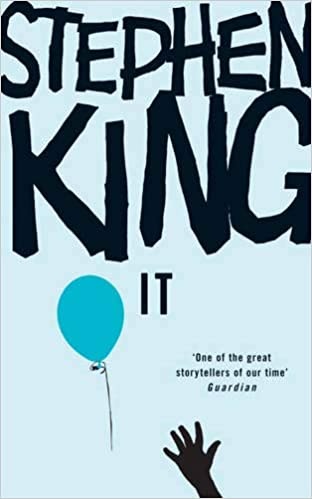This was a behemoth of a book that took me the better part of a year to read (as an aside, I am very glad I have multiple books on the go these days, rather than just one, like when I read Ulysses) and during that time, I had very mixed feelings. Sometimes I’d read a chapter and think “Wow, this did a really good job of capturing the bonds of friendship, what a good book”, other times I’d read a chapter and think “gosh, this is boring, why is this description of a river so long?” and sometimes I’d even think “oh my goodness, what is wrong with Stephen King, why did he write in a child orgy?”
So, for those who don’t know, It tells the story of a small, rural American town in which an otherworldly entity manifests and wrecks havoc on the population for its own satisfaction/survival… except nobody in the world, even the town’s citizens, ever seem to realise that there have been so many violent and horrific incident taking place there. Most iconically, ‘It’ takes the form of Pennywise the clown, who comes after the main group of characters (seven kids who call themselves The Losers Club). The story jumps around in time, and we see them learning about It and getting ready to face It as children, as well as returning to their hometown as wary adults because It seems to have returned.
There are some bits about how friendships grow and change after childhood, but how they remain important into adulthood which I thought were quite beautiful. Indeed, many of the bits about them becoming friends and whiling away their time in childish ways were so appealing to me, that I sometimes thought it didn’t need the supernatural horror at all. The human drama was well-written and I felt invested in all of their relationships – by far, this was my favourite thing about It.
Something that was more hit and miss, was the story’s side-steps. There were various flashbacks and scenes of horrific events caused by It, which weren’t directly connected to the main storyline. Some were quite interesting, others were quite bland, and some felt needlessly gratuitous. What I didn’t like, for example, were stories about homophobic or racial violence, which was attributed to the presence of It. The thing is, such awful things don’t need to be attributed to a supernatural evil, because they happen all the time in the real world, and using them to heighten the sense of horror surrounding the titular monster just feels a little bit too exploitive – putting violence against minority groups in there just for the shock factor.
Having said that, I don’t mean to accuse Stephen King of being racist or homophobic himself. Generally speaking, I would say the book is fairly progressive in that regard, because those violent acts of prejudice are always condemned – along with domestic violence too. So while I am glad to see these things being rightly criticised, even in a slightly older piece of writing, I’d still question using such awful real world horrors to primarily reinforce the evil of Pennywise. I am not against writers tackling these subjects by any means, but it felt just a little tasteless.
As for the horror itself – it was a little too in-your-face for me. The descriptions of the terrifying forms that It took were never particularly creepy in my mind. Some people, I’m sure, will get the shivers when they read descriptions of scary monsters and lots of gore, but I prefer horror that doesn’t show too much. Creepiness that only becomes apparent when you read between the lines. Having said that, I still felt some degree of tension during these scenes, because I cared about the characters and I didn’t want anything bad to happen to them.
I should also mention the infamous “child orgy” scene, which was really uncomfortable to read and completely unnecessary. I won’t spoil the full context as it’s near the end, but basically, the one female character in the main group of friends has sex with all the male characters, one after the other, and they’re all around ten or eleven years old. There’s a really loose story reason for all this, which felt very forced, and I don’t think this should have been included. The ‘reason’ that it was included, which I won’t spoil, kind of conveys a rather old fashioned (and in my mind, harmful) attitude about sex.
Overall, I am glad that I read this book. There are several aspects of it that I really admire Stephen King for. There are also, however, several aspects that are irritating – long tangents and things that we know about in far too much detail (the whole history of a river, loads of details on the contents of one character’s medicine cabinet, etc). It can often feel annoying when you want the story to move on, but you’re stuck reading about some historic event. I think what Stephen King wanted to do, was make Derry (the book’s setting) really feel like a real location, but in the process, gave us far too much information, which pads the book out significantly. There are some nuggets in here, for sure, but mining through to find them will sometimes feel like a chore.
Rating: 6.9/10

